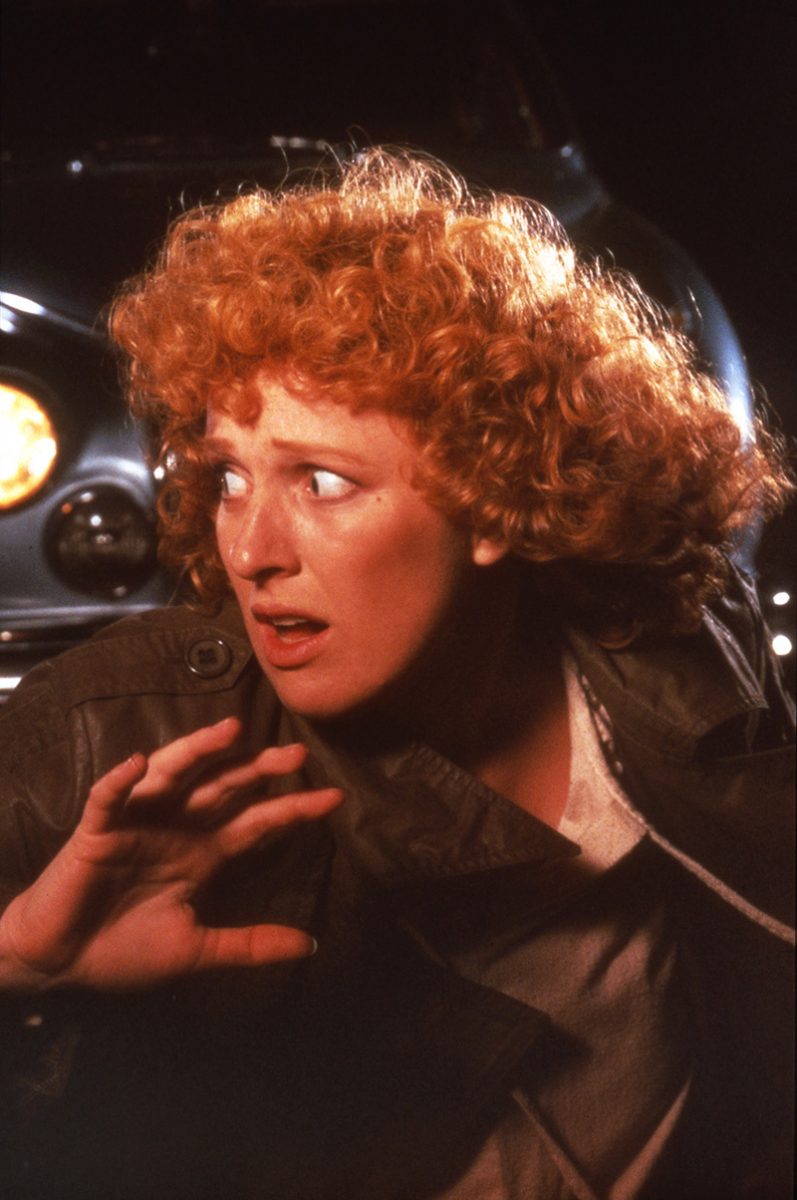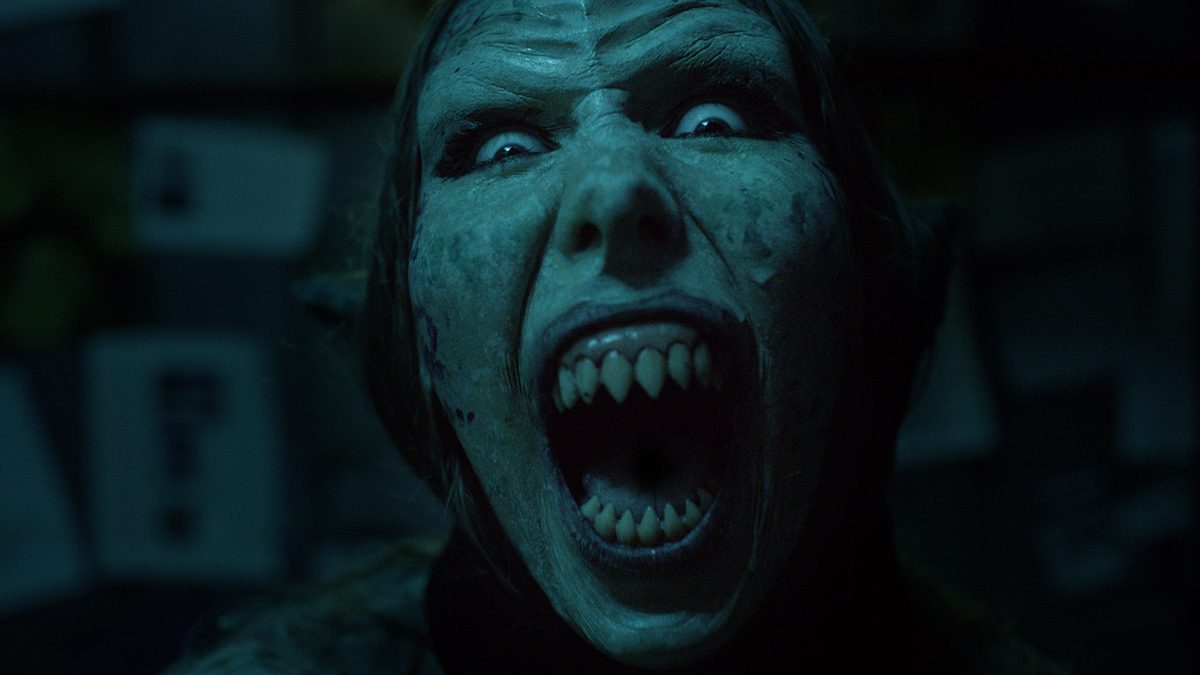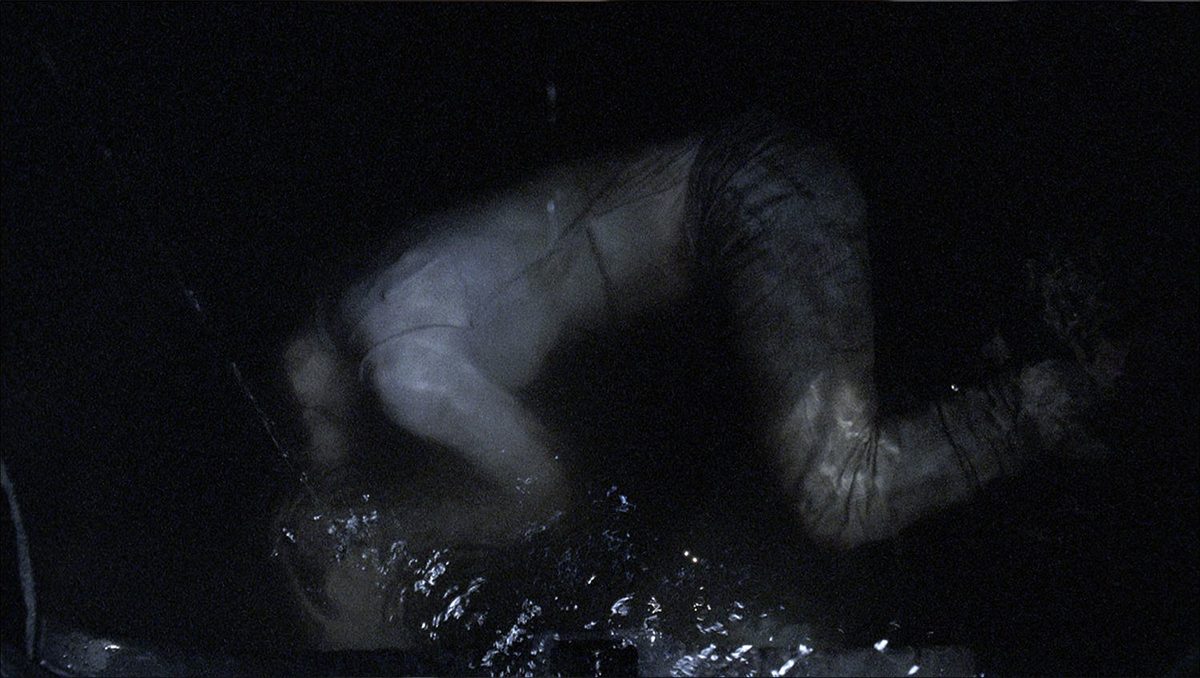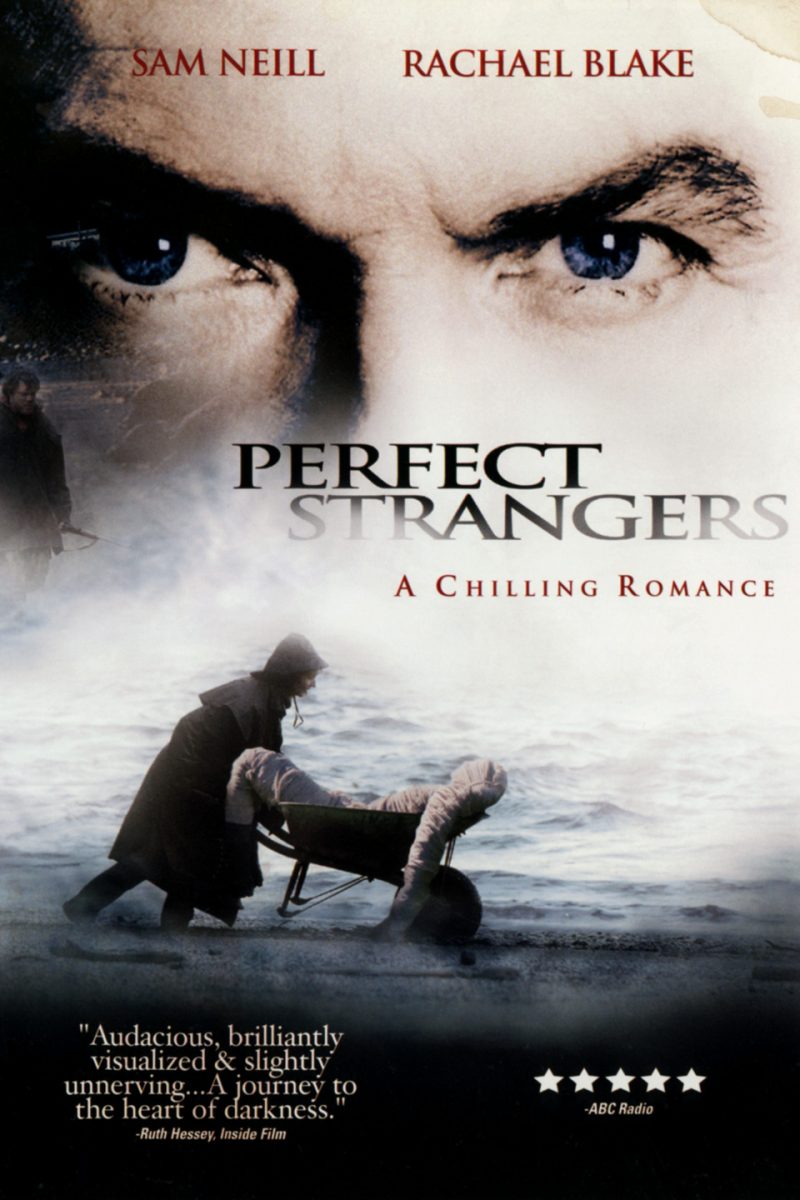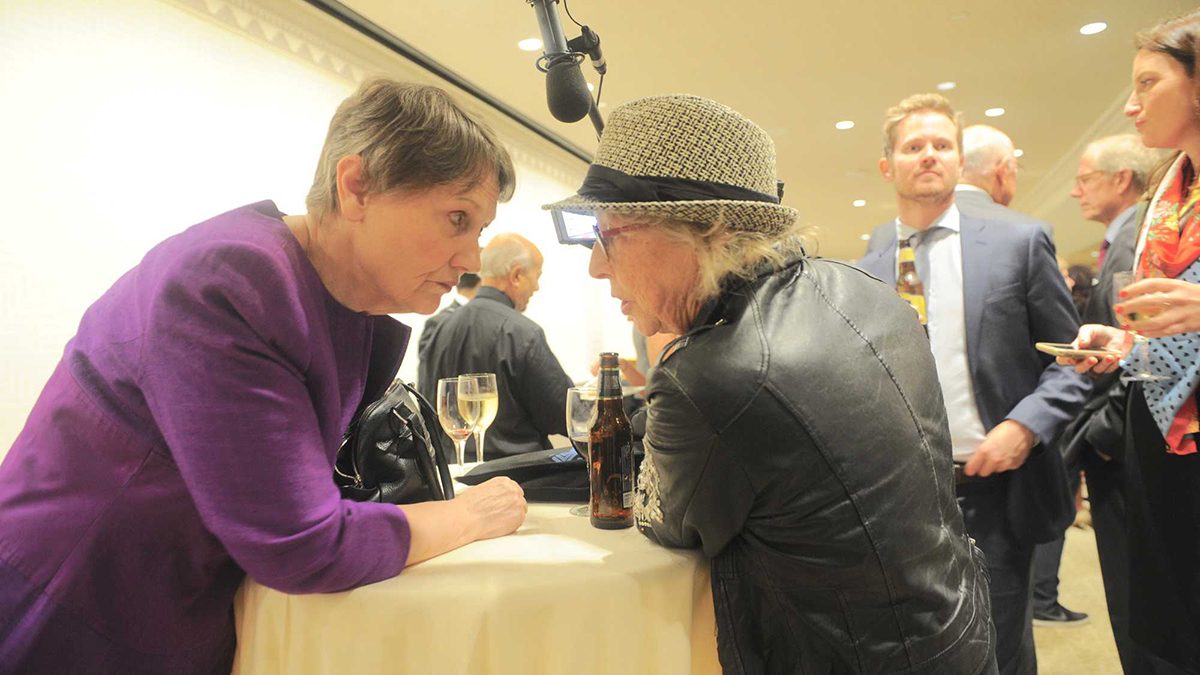Lauren Carroll Harris and Lucy Parakhina talk feminism in film then and now with the filmmaker at the 2017 Stranger With My Face International Film Festival.
Read more about Gaylene Preston and the 2017 Stranger With My Face International Film Festival:
realtime.org.au/stranger-with-my-face-discovering-gaylene-preston/
realtime.org.au/stranger-with-my-faces-dark-pleasures/
In early May I flew to Hobart in anticipation of some of the most interesting dark genre programming around, at an atmospheric film festival that’s hugely supportive of women filmmakers. This was my third experience of Stranger With My Face International Film Festival, now in its fifth year (not counting a hiatus in 2015). Founded in 2012 by Tasmanian filmmakers Rebecca Thomson and Briony Kidd, Stranger With My Face focuses on horror and other genre films directed by women. The one festival of its kind in Australia, it not only provides a rare opportunity to see genre cinema from a range of thought-provoking female perspectives, but also acts as an incubator for women’s feature film projects through its intensive Attic Lab workshop for selected participants.
This year was notable for the presence of renowned New Zealand director Gaylene Preston as both featured filmmaker and mentor for the festival’s developmental Attic Lab. One of the most striking features of the two subversive Preston thrillers included in SWMF’s retrospective program—Mr Wrong (1984) and Perfect Strangers (2003)—was how resonant their commentary on sexism and gender roles remained, despite the passage of time. In a post-screening Q&A, Preston remarked on the films’ implicit feminism, “All the things you see in Mr Wrong came from a point of rage.” While there were strong films at the festival that explored themes other than misogyny, those reviewed here—bar one—contain elements of this rage. All are explorations of the perilousness of feminine archetypes: the ingénue, the ‘slut,’ the dead girl, the siren and the saint.
Mr Wrong
As Preston put it, “There’s a whole interrogation of ‘nice’” in Mr Wrong, a film about a good-natured, unworldly young woman, Meg (Heather Bolton), who buys a powder-blue Jaguar from a used-car salesman so she can drive from the city to visit her parents on weekends. Meg has a pleasant, open countenance and an Annie-like shock of red curls that suggests she hasn’t quite reached the level of urban sophistication of her city housemates. She’s softly spoken, a bit of a worrier. Despite initial reluctance to purchase the large car, she takes the wheel with a sense of optimism, underlined by the film’s jaunty opening theme. This cheerful start is disrupted on her first long drive home out of Wellington, when, drawing up for a rest break at dusk, the car silhouetted against the sea, she has a terrifying, inexplicable experience—something that’s depicted simply yet so creepily it sets us, like Meg, on edge for the rest of the journey.
Mr Wrong is gloriously multifaceted. Looked at one way, it’s a suspenseful, not particularly serious thriller, enjoyably goofy at times (as in a scene where Meg gallivants through a field in her loud jumper after romantically reconnecting with a childhood friend). From another angle, it’s artistic Gothic horror, with its vivid nocturnal cinematography and nightmarish conjuring of rain-swept roads and pale apparitions, the heroine’s face appearing half in shadow behind the wheel. What makes the film singularly compelling, however, is the constant dull murmur of sexual aggression Meg endures; something that threatens to escalate if she fails to be sufficiently ‘nice.’
The ideals of freedom and independence represented by Meg’s car and city job are undercut by the recognition that there’s no escaping harassment, be it from corporeal sexists or an increasingly malevolent vehicle. In this way, and particularly for women, Preston quite viscerally aligns Mr Wrong’s supernatural horror with everyday oppression. It’s telling that some contemporaneous reviewers failed to pick up on her subtext. In her introduction to the screening, academic Deb Verhoeven quoted from the Evening Post, which praised Mr Wrong as, “a fine film endowed with feminine intuition but free of feminist cant.” This, despite the cathartic Gothic finale, a repudiation of violence against women and demonstration of female solidarity powerful enough to reach beyond the grave.
You can watch the trailer here.
Slapper
Everything that can go wrong in Slapper [Australia, 2017], will go wrong in Luci Schroder’s unflinching portrayal of a day in the life of Taylah (Sapphire Blossom), a teenage single mother who’s desperately in need of the morning-after pill—and is broke. The ensuing race against the clock exposes the harsh, inequitable side of hetero sex, compounded by class inequality and petty indifference; no need for supernatural horror in this short drama. Moving through grey, semi-rural suburbia and various chaotic domestic situations, Taylah attempts to hustle the money in increasingly degrading, dangerous ways, trailing her young daughter in her wake.
Schroder has garnered recognition for her music video work, including for the Alpine track “Hands,” which simultaneously deploys and subverts tropes of frank female sexuality. Slapper does away with the music-video gloss but retains the frankness with Blossom’s raw, aggressive physical performance. The fact that Taylah is capable of nastiness doesn’t lessen the empathy with her situation; it just underlines her fundamental lack of agency. Schroder and co-writer Sam West maintain a constant edge of aggression in their economic, skilfully paced narrative, with the excruciating denouement denoting the hopelessness and self-perpetuating misery of systemic oppression.
The Man Who Caught a Mermaid
With this impressively assured graduate short, Kaitlin Tinker [Australia, 2017] presents another sort of suburban nightmare in her ambiguous account of a retired Australian bloke who dreams of catching a mermaid, and succeeds—perhaps. In a seamless transition from gentle whimsy to stark horror, Tinker upends the traditional myth of the siren luring men to their deaths. In so doing, she exposes the darkly constrictive effect of romantic fantasies on women. The film complements Gaylene Preston’s Perfect Strangers, which also critiques the romantic ideal.
What Happened to Her?
Perhaps the bizarrely common filmic trope of the submerged female corpse is a successor to the mermaid. Part-video essay, part-creative documentary, Kristy Guevara-Flanagan’s short film What Happened to Her? [USA, 2016] is a startling assemblage of film and TV clips demonstrating the sheer proliferation of nubile female dead bodies on our screens. There’s no identification of individual titles, but the clips derive from serious, artistic drama (Twin Peaks, True Detective) as well as forgettable forensic crime shows. On her back or face down, in the sand, in the water (of course) or exposed to the gaze of some sad-eyed (usually male) detective in the morgue, “the body” is allowed to speak here through a quiet voiceover, as an actor relays her experience playing the naked corpse (or perhaps it’s several actors, talking about several corpses; it’s hard to tell) while a seemingly inexhaustible collection of examples is displayed. To uncanny effect, she details what it’s like to be told to strip naked and float face-down in water playing dead; to have bruises painted on you by a sleazy make-up artist; to feel vulnerable in front of all-male crews; to embody a real victim on a true crime show. The voice prompts thought about all the women—fictional and real—whose murders have become an entertainment fetish.
The Book of Birdie
Not polemical so much as a transportive mood piece, Elizabeth E Schuch’s first feature, The Book of Birdie [UK, 2017], nonetheless explores an historically powerful female entity—the Christian mystic. It begins with a teenage girl placed in a snowbound nunnery by her grandmother. Played expressively by Ilirida Memedovski, Birdie has the idealised appearance of a fairytale orphan with her heavy dark hair, pale skin and enormous eyes, on which the camera dwells in close-up. Quietly watchful, she’s both childlike and otherworldly.
The hushed atmosphere of the cloister in which Birdie finds herself is enhanced by the snow falling outside. A cocoon, it magnifies the usual intensity of adolescent emotions, giving rise to extravagant visions and fancies. Two other films about adolescent girls in female-dominated institutions are brought to mind: Vardis Marinakis’ numinous Black Field (2009), set in a medieval Greek nunnery, and Dario Argento’s Suspiria (1977), with its dreamlike bizarreness and vivid use of colour.
A strikingly visual director, Schuch cleaves to various hallmarks of Gothic Romance: the cavernous stone nunnery with its elaborate spiral staircase, Catholic paraphernalia, wraiths, blood, snow, the heroine’s appearance, her innocence and mysticism. But she pushes into unexpected territory by making Birdie a source of great energy rather than a wan victim. Joy imbues her brilliantly coloured visions/hallucinations; she jokes with ghosts, falls in love with the groundsman’s daughter and moves through the convent beatifically. Seizing all the imagery at hand in this austere environment, she devises idiosyncratic rituals incorporating Catholic iconography, superhero comics, menstrual blood and—most disturbingly—a miscarried foetus. Through her rituals, Birdie can gain power over female bodily pain and possible past trauma by creatively transforming them into something transcendent.
Sadly, though, Catholicism places inevitable limitations on its mystics; Birdie must eventually confront the impossibility of merging spiritual and corporeal worlds—though not before offering a glimpse of an alternative approach.
It was invigorating, as always, to see distinctive filmmakers at Stranger With My Face shining such personal light on female experience, challenging the dominant narrative through captivating, angry, inspired, artistic works from past and present.
–
Stranger With My Face International Film Festival 2017, Director Briony Kidd, Salamanca Arts Centre, Hobart, 4-7 May
Top image credit: What happened to her?
“The history of Tasmania is a dark history,” said Briony Kidd, director of Stranger With My Face International Film Festival, to the tight community of filmmakers and their audience on opening night. “The Tasmanian Gothic is about the suffering of Aboriginal people and women and convicts. Their untold suffering is what we must talk about when we talk about a horror film festival in Hobart.”
Van Diemen’s Land is indeed the ideal, spooky setting for a feminist festival of genre cinema, now in its fifth year. Kidd’s curation is lean with an eye on the past and the forgotten, and early May brings 5.30pm sunsets and long nights of films and discussion at the Peacock Theatre, expanding beyond the strictures of horror to include mystery and suspense filmmaking. It’s an inclusive, chatty festival: a spirit of friendly camaraderie stretches beyond the screenings, aided by the involved presence of international guests (including Roxanne Benjamin, producer of the anthology film XX shown on opening night) and young filmmakers in the Attic Lab development program.
For me the retrospective programming stood out from the contemporary material. Kidd honoured the work of US cinematographer Sandi Sissel on the 1991 horror film The People Under The Stairs, saying that while many people think of it as a “Wes Craven film, it’s also a Sandi Sissel film.” It’s a fantastical genre piece, whose prologue and epilogue frame it as a brilliant satire of capitalism and racism: in a gloomy urban hellscape, white landlords are keeping their black tenants in poverty, biding their time until they can gentrify and sell their property at inflated prices. The centre of the film departs from this reality altogether. Sissel’s camerawork, largely devoid of CGI and instead resting on dynamic movement, hurls us around the haunted house of two demented slaveowner-landlords (played with hyper-theatrical relish by Wendy Robie and Everett McGill, who also both played Nadine and Big Ed in Twin Peaks around the same time), whose sadism finds a parallel in the real-life horror of systemic racism in the USA.
The grey-green slopes of the hillside city of Hobart found a perfect equivalent in the New Zealand settings of the festival’s major retrospective, a two-film stream dedicated to writer-director-producer Gaylene Preston. Coming of age in the 1970s—a time of intense feminist activity—shaped Preston’s trajectory as storyteller with a “consciousness-raising” agenda. “I suppose like a lot of people of my generation, I’d been brought up with the Hitchcock movies,” Preston told RealTime. “I also had a feminist analysis, and I felt that the way thrillers are structured is actually a danger to women. I thought the culture of thriller needed a bit of a shake-up.”
Mr Wrong
Though she’s spent the decades mostly making documentaries, for her first feature Preston flipped a common genre staple. Rather than a haunted house, Mr Wrong (1984) centres on a haunted car. Protagonist Meg thinks she has found the perfect vehicle: a gorgeous used Jaguar in top condition, which will afford her the freedom of long rides around the country and independence from her old-fashioned parents. But the Jag’s second-hand eccentricities give way to full-blown evil as it begins to exert a destructive force on her life. It emits the gasps of a dying man and delivers her human visitors who aren’t who they seem or who vanish into thin air.
Here a couple of themes come together: a satire on the delusion of the perfect man and what Preston described at the festival as “an interrogation of ‘nice.’ Meg is such a nice girl.” Men are forever invading her space and she’s forever accommodating them. When her housemate’s ex-boyfriend casually intrudes into their house, she finds herself making him a cup of tea; when the car salesman insinuates the Jag is too big for her, she’s polite in her insistence; when a strange man jumps into her car at the traffic lights, she asks him how far he’s going. Preston’s screenplay, based on a story by English novelist Elizabeth Jane Howard and co-written with Geoff Murphy and Graeme Tetley, is exquisitely attuned to the ways that sexism manifests in tiny pushes and pulls in the interpersonal spaces between men and women. The casting of Heather Bolton brings Meg’s niceness to vivid life: rather than the wide-eyed waif at the centre of many horror films, Bolton has the charisma and empathy of a regular person onscreen, and her hyper-animated expressions and transparent acting style give the sense of a young woman who’s been overlooked her whole life—who has done all the ‘right’ things, only to be left frustrated and exploited.
Meg’s niceness gives way to a quiet toughness as she comes closer to discovering the truth of her car’s haunting, a backstory that points to the film’s thematic undertow of gendered violence and missing women. Like the films of David Lynch, the true horror is realistically dark, coming not from the loopy or the insane but from the familiar and the domestic. Meg must not become the next victim.
Preston is too subtle a filmmaker to create a frame with brutality squarely in the centre: there’s not a whiff of exploitation. Cinematographer Thomas Burstyn’s camera is always slyly misdirecting our vision: you think a dangerous man is going to loom out of the background, only for him to pop out of a darker, unexpected space in the foreground. Indeed, Mr Wrong struck me as one of the few films of this type—a suspenseful thriller structured around the pursuit and capture of women—that doesn’t objectify women’s bodies in the formal ways that the camera shoots and frames them. Likewise, a sweet, sincere romance for Meg is a subplot rather than a narrative goal and a hinge for happiness, as well as a nice thematic hint that romantic contentment isn’t merely a myth. The final sequence’s message of solidarity between women—beyond the grave, of course—offers a closing flip of “the final girl” (the survivor in slasher films) horror trope and would be impossible in the films of Mr Wrong’s generic precedents by Hitchcock and De Palma.
What was most surprising to me was Mr Wrong’s arrival in 1984 when the NZ film industry was at such a nascent stage. Yet in Preston’s creation, genre knowledge, filmmaking skills and well-formed ideas are all there. This is deeply subversive and innovative filmmaking.
You can watch the trailer here.
Perfect Strangers
For her second feature, Perfect Strangers (2003), Preston conjured another perverse fairytale—in what she calls a critique of “the Disney version of romance [that] makes us dangerous to ourselves,” and an answer, 20 years later, to the questions raised in Mr Wrong. In a swift series of scenes totalling no more than a few minutes, we’re introduced to Melanie (Rachael Blake), a no-bullshit, independent woman out with her friends for the night. In contrast with Meg in Mr Wrong, Blake appears to be a tough, smart, wry woman familiar to us from her role in the 1990s ABC crime series, Wildside. She has a weird sense of sexual charisma anchored in her opaque approach to performance; she refuses to emotionally telegraph too much, holding back a lot from the audience, which gives her considerable power. At a pub, Melanie meets an unnamed man (Sam Neill), another Mr Right/Wrong who at first seems kind and gentle. When he asks her, “Your place or mine?” she answers, “I’ve been to my place before.” He takes her to an idyllic houseboat, but when Melanie wakes, she finds herself kidnapped to a windswept, gothic island (evoking memories of Jane Campion’s The Piano), where The Man has planned a forcefully romantic getaway involving candles, pearls and a black evening dress and pearls for her. It’s a sinister game in which she’s cast in the two-dimensional role of ingénue. But like Meg, we sense that Melanie is neither passive nor a femme fatale.
The great paradox shared by many genre films is that they tell the same story the same way, which means they fail to thrill. Perfect Strangers sets up a conventional expectation that the narrative will hinge on Melanie’s characterisation as a victim either escaping or dying on the island. Preston throws out this plot forecast and cultural familiarity within the first half hour, speeding up the usual three-act structure to free a further hour of plot twists that are so thrilling that I found them fantastically stressful. Preston shows that innovating a genre involves both knowledge of and non-compliance with convention. Here, the narrative twists are based on Melanie’s realisation that The Man is her only ticket off the island. This gives way to a kind of Stockholm Syndrome that reflects a deeper truth about relationships: that they inevitably involve some level of denial, and that delusion and devotion are closer than we can ever recognise. As with Mr Wrong, the narrative perversities stem from clear-headed psychological insight about what makes us hopeful in love against all logic. After the screening, Preston told festival-goers that she likes “long shots. When you cut, you let the audience out, psychologically.” That was evident. She never let us out of the confined and increasingly mad interior world that Melanie comes to know on the island.
SWMF’s small but considered retrospective of Gaylene Preston’s work convinced me of a few things. First, she is a legitimately legendary yet overlooked figure in genre filmmaking. Fame has eluded her for any number of reasons—she’s not American and commercial distribution precludes many of the most interesting filmmakers from showing on mainstream screens. Second, gender equity in the film industry cannot just be seen as something to be achieved on- and off-screen in the production realm. Change needs to happen at all levels of the industry: distribution, exhibition and festival programming. Small festivals like SWMF do important work in illuminating the blackholes in film history’s canon and providing local, intelligent injections to screen culture and politics outside franchise-drenched multiplexes. And yet there’s no dedicated stream of festival funding through Screen Tasmania, which provided SMFW with only a very small amount of sponsorship.
Gender inequity in film criticism has also contributed to the gaps in appreciation for filmmakers like Preston. Critics originally referred to Rachael Blake’s character in Perfect Strangers as a “lame-brained horror heroine”, and, we were told at the festival, to Mr Wrong as full of “quirks and Kiwi-isms.” Rather than being taken seriously, the films were seen as the whimsy of a mere woman. But the films’ thematic and emotional logic rang true to my experience, despite their outlandish plots. When so many critics have been (sexist) men, criticism begins to coalesce around a singularity of voices and experiences. So does storytelling itself. When it comes to ending gender inequity in cinema, Preston’s work reminded me that there is even more at stake than correcting rampant workplace discrimination in the screen industry. Storytelling changes when the gender of the storyteller changes, and Gaylene Preston has brought a uniquely female and feminist perspective to a male-dominated genre. The prospect of gender equality opens up so many new avenues for cinema: Mr Wrong and Perfect Strangers offer us a momentary, pleasurably perverse glimpse of unexplored directions.
Australian and New Zealand viewers can see Mr Wrong and Perfect Strangers on the New Zealand Film Commission’s VOD site, NZ Film On Demand.
You can read about Preston’s extensive film career here and here.
Gaylene Preston’s feature documentary, My Year with Helen about former New Zealand Prime Minister Helen Clark screens in the 2017 Sydney Film festival on 10 and 11 June.
–
Stranger With My Face International Film Festival, director, Briony Kidd, Salamanca Arts Theatre, Hobart, 4-7 May
Top image credit: Rachael Blake, Perfect Strangers


